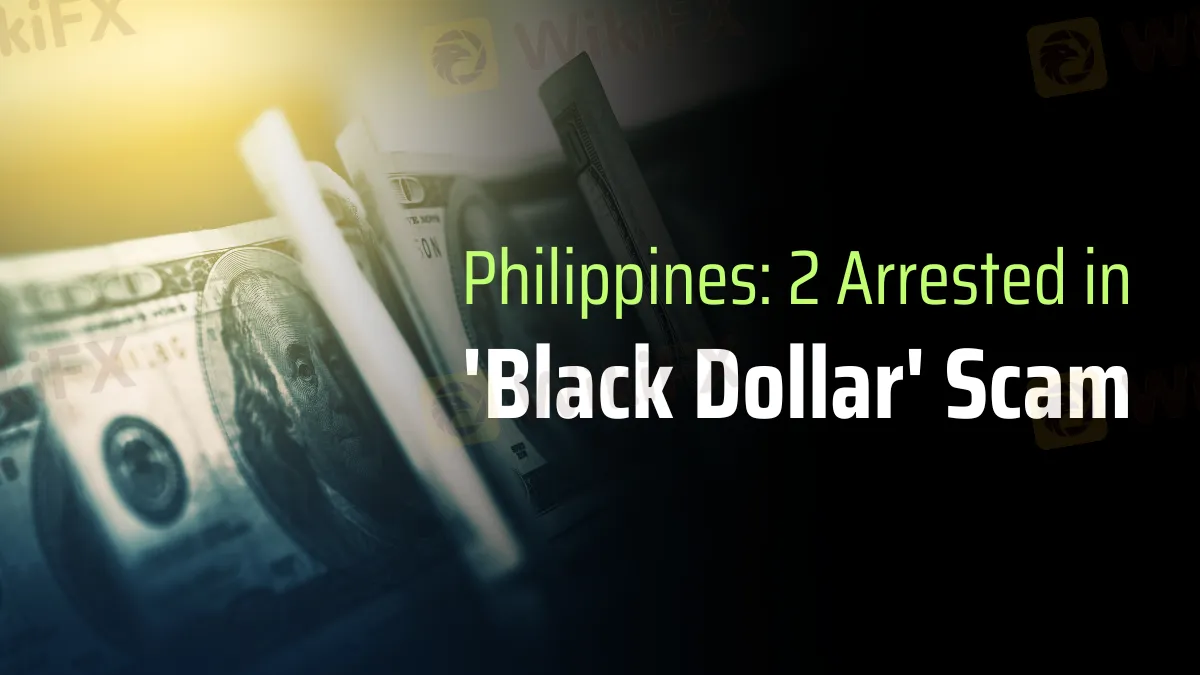简体中文
繁體中文
English
Pусский
日本語
ภาษาไทย
Tiếng Việt
Bahasa Indonesia
Español
हिन्दी
Filippiiniläinen
Français
Deutsch
Português
Türkçe
한국어
العربية
Philippines: 2 Arrested in 'Black Dollar' Scam
Abstract:Two suspected scammers were arrested in the Philippines for a 'black dollar' scam, deceiving victims into buying chemicals to clean and convert counterfeit currency.

The National Bureau of Investigation (NBI) apprehended two suspected fraudsters in accordance with the Revised Penal Code and the Cybercrime Prevention Act. The accused reportedly duped their victims into purchasing chemicals to “clean and convert” counterfeit cash into US dollars.
The fraud included persuading victims that certain chemicals, when appropriately combined, could change counterfeit cash into genuine US dollars. So-called “black dollar” fraudsters in the Philippines have utilized this intricate deception to deceive their naïve victims.
The NBI's Cybercrime Division (NBI-CCD) conducted a sting operation that resulted in the arrest of two African males participating in the “black dollar” scheme. The investigation began on Wednesday in response to a report from a victim who had fallen victim to the fraud.
Arrest Details
The operation began when a complaint was made against a man masquerading as “Dr. Paul.” NBI agents captured Khan Fonkam and his brother Awa Fonkam, both Cameroonians, at Bonifacio Global City (BGC), Taguig, following Director Jaime Santiago's orders.

The Scam Emerges
According to the lawsuit, “Dr. Paul” solicited the victim about investing in the Philippines. They met at a hotel in Makati City on July 5, 2024, and the victim gave them Php400,000 (about $6,844).
“Dr. Paul” then carried out a bogus “decoding process,” which included powdering the money and wrapping counterfeit notes in foil before immersing them in boiling water. He advised the victim not to open the package for 24 hours to enable the chemicals to “work.”
Suspicion and Discovery by the Victim
The victim opened the gift at home, suspicious, to see just black paper inside. When he sought to call “Dr. Paul” for an explanation, he was informed that they couldn't meet and that Php50,000 (about $855) was required for more drugs.
Further inquiry showed that “Dr. Paul” was Khan Fonkam, whom the NBI-CCD had previously captured on May 31, 2024. This finding led the victim to notify police about the deception.
Charges Filed
The accused are currently facing charges at Taguig City Prosecutor's Office. They are accused of estafa (Article 315 of the Revised Penal Code) and unlawful possession and use of counterfeit money (Article 168 of the Revised Penal Code). These accusations are related to Section 6 of Republic Act No. 10175, generally known as the Cybercrime Prevention Act of 2012.
The NBI's quick response in apprehending these fraudsters exemplifies continuous efforts to fight cybercrime and safeguard individuals from deceptive scams. Victims of such scams are advised to report them to authorities so that these misleading tactics might be put a stop to.

Disclaimer:
The views in this article only represent the author's personal views, and do not constitute investment advice on this platform. This platform does not guarantee the accuracy, completeness and timeliness of the information in the article, and will not be liable for any loss caused by the use of or reliance on the information in the article.
Read more

Alleged Concerns with TradeEU.global's Trading Practices
An individual trader has come forward with allegations of an unfavourable experience while using the services of the broker TradeEU.global.

Lured by False Promises: Malaysian Driver Lost RM218K to an Investment Scam
A 49-year-old e-hailing driver in Malaysia fell victim to a fraudulent investment scheme, losing RM218,000 in a matter of weeks. The scheme, which falsely promised returns of 3 to 5 per cent within just three days, left the individual financially devastated.

SEC Fines Broker-Dealers $275K for Incomplete SAR Filings
SEC fines three broker-dealers $275K for filing deficient Suspicious Activity Reports, highlighting the importance of compliance with SAR filing regulations.

Mastercard's 2030 Vision: Biometric-Driven, Tokenized Payments
Mastercard’s tokenized future will eliminate card numbers and passwords by 2030, ensuring seamless, secure, and biometric-driven online shopping experiences.
WikiFX Broker
Latest News
Saxo & Portuguese Bank Partnership
SEC Fines Broker-Dealers $275K for Incomplete SAR Filings
What Makes Cross-Border Payments Easier Than Ever?
Trader Exposes Unethical Practices by STP Trading
Lured by False Promises: Malaysian Driver Lost RM218K to an Investment Scam
FTX Sets March 2025 Timeline for Creditor Payouts: What It Means for Investors
What is an Economic Calendar? How it works
Italian Regulator Warns Against 5 Websites
Mastercard's 2030 Vision: Biometric-Driven, Tokenized Payments
SFC Freezes $91M in Client Accounts Amid Fraud Probe
Currency Calculator


